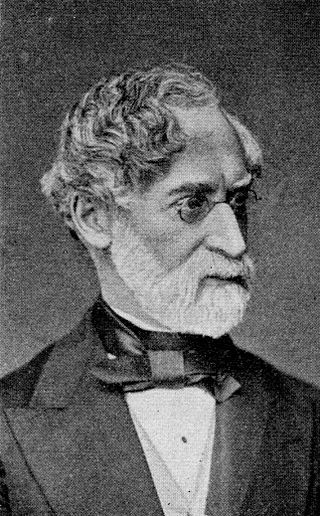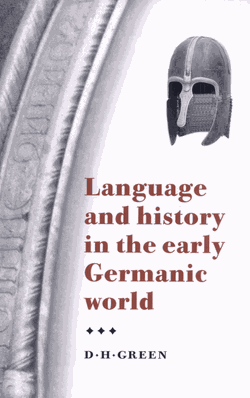Related Research Articles

Leonard Bloomfield was an American linguist who led the development of structural linguistics in the United States during the 1930s and the 1940s. He is considered to be the father of American distributionalism. His influential textbook Language, published in 1933, presented a comprehensive description of American structural linguistics. He made significant contributions to Indo-European historical linguistics, the description of Austronesian languages, and description of languages of the Algonquian family.

The Rev. Archibald Henry Sayce was a pioneer British Assyriologist and linguist, who held a chair as Professor of Assyriology at the University of Oxford from 1891 to 1919. He was able to write in at least twenty ancient and modern languages, and was known for his emphasis on the importance of archaeological and monumental evidence in linguistic research. He was a contributor to articles in the 9th, 10th and 11th editions of the Encyclopædia Britannica.

Karl Viktor Müllenhoff was a German philologist who specialized in Germanic studies.

Professor Johann Georg Bühler was a scholar of ancient Indian languages and law.

Joachim Heinrich Campe was a German writer, linguist, educator and publisher. He was a major representative of philanthropinism and the German Enlightenment.

Muspilli is an Old High German poem known in incomplete form from a ninth-century Bavarian manuscript. Its subject is the fate of the soul immediately after death and at the Last Judgment. Many aspects of the interpretation of the poem, including its title, remain controversial among scholars.
This is a selected list of works by and about Martin Luther, the German theologian. The emphasis is on English language materials.
The Institute of Modern Languages Research is a research institution associated with the University of London. A constituent institute of the School of Advanced Study based on the second floor of the Senate House, the Institute of Modern Languages Research promotes and facilitates national and international collaborative, cross-disciplinary and cross-cultural research by means of seminars, lectures, workshops, colloquia, conferences, a fellowships programme, and its various research centres.
Otto Pächt was an Austrian art historian and one of the representatives of the second wave of the Vienna School of Art History. He mostly wrote on the medieval and Renaissance art of Europe. An exile from the Nazis, he taught in England and United States, before returning to Austria in 1963.
Karin Anna Reich is a German historian of mathematics.

Der Busant, also known as Der Bussard, is a Middle High German verse narrative, containing 1074 lines of rhyming couplets. The story tells of a love affair between the Princess of France and the Prince of England, who elope but are separated after a buzzard steals one of the princess's rings. After more than a year of separation, with the prince having gone mad and living as a wild man, they are reunited.
August Max Closs was a professor of German studies. Born in Austria, he studied German and English language and literature, and in 1929 moved to London. There he taught at University College, and became friends with the German scholar Robert Priebsch, whose daughter Hannah he married. In 1931 he began teaching at the University of Bristol, where he stayed until his retirement in 1964. He was a prolific author on and editor and anthologizer of German poetry. In addition, he was a dedicated collector of manuscripts and books; part of his collection was sold to Princeton University, and the rest forms the Priebsch-Closs Collection Institute of Germanic and Romance Studies. He is remembered also for his efforts to bring about German-English reconciliation after the Second World War, especially between the cities of Bristol and Hannover.
Hannah Margaret Mary Closs (1905-1953) was an art critic and novelist. She wrote three novels and a book on aesthetics.
Elias von Steinmeyer was a German philologist.
The Zeitschrift für deutsches Altertum und deutsche Literatur is a quarterly peer-reviewed academic journal in the field of German studies with emphasis on the older periods. It was established in 1841 and is the oldest periodical in early Germanic studies still publishing.
Leonard Robert Palmer was author and Professor of Comparative Philology at the University of Oxford from 1952 to 1971. He was also a Fellow of Worcester College, Oxford. Palmer made some significant contributions to the study of Classical languages, and in the area of historical linguistics.
Arthur Thomas Hatto was an English scholar of German studies at the University of London, notable for translations of the Medieval German narrative poems Tristan by Gottfried von Strassburg, Parzival by Wolfram von Eschenbach, and the Nibelungenlied. He was also known for his theory of epic heroic poetry, and related publications. He retired in 1977, and in 1991 the British Academy elected him as a Senior Fellow.
Klara Elisabeth Karg-Gasterstädt was a German medievalist, professor of German philology at the University of Leipzig and head of the effort to publish the Old High German Dictionary.
Roy Albert Wisbey was a British medievalist, Professor of German at King's College, London, and one of the leading figures in British German studies. He was also a pioneer in the field of digital humanities, founding the Literary and Linguistic Computing Centre in Cambridge in 1964 and later promoting the establishment of the Centre for Computing in the Humanities at King's. Over a period of 40 years he led the transformation of the Modern Humanities Research Association (MHRA) into a major scholarly publisher. He was recognised by both the German and Austrian governments for his contribution to German Studies.

Language and history in the early Germanic world is a book by Dennis Howard Green, the Schröder Professor of German at the University of Cambridge. It was published in hardback by Cambridge University Press in 1998. The book uses linguistic evidence for the study of early Germanic culture and history. A paperback edition was published by Cambridge University Press in 2000. An Italian translation was published in 2015.
References
- 1 2 3 Penzl, Herbert (1981). "Rev. Robert Priebsch-Elias von Steinmeyer: Briefwechsel". Language . 57 (1): 229–30. doi:10.2307/414304. JSTOR 414304.
- 1 2 O'C. Walshe, M. (1981). "Rev. of Cross, Robert Priebsch-Elias von Steinmeyer: Briefwechsel". Modern Language Review . 76 (3): 755–56. doi:10.2307/3727475. JSTOR 3727475.
- ↑ "Closs, August Max". Oxford Dictionary of National Biography (online ed.). Oxford University Press. doi:10.1093/ref:odnb/29986.(Subscription or UK public library membership required.)
- ↑ Flood, John L. (1991). "Die mittelalterlichen Handschriften der Bibliothek des Institute of Germanic Studies, London". Zeitschrift für deutsches Altertum und deutsche Literatur . 120 (3): 325–30. JSTOR 20658056.